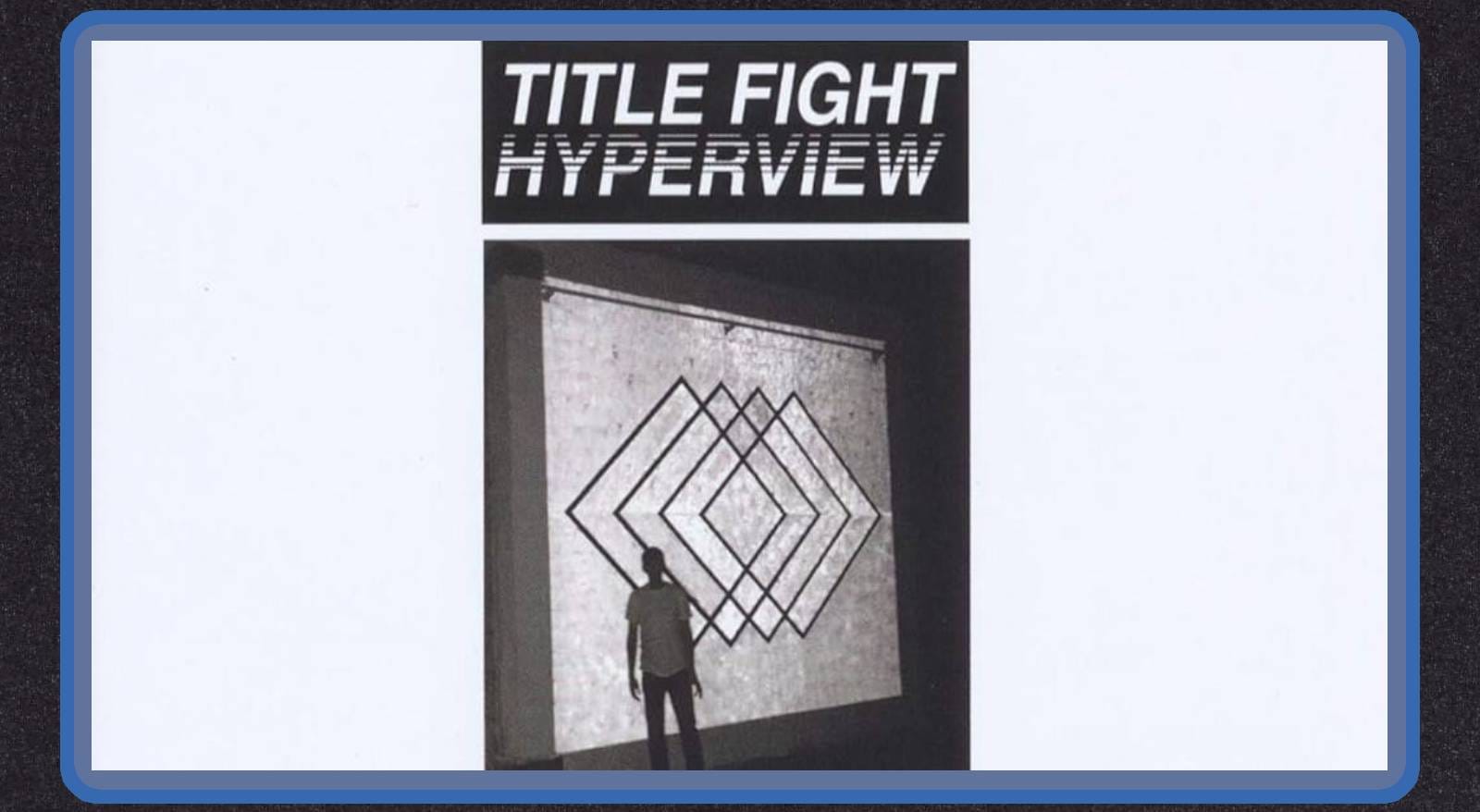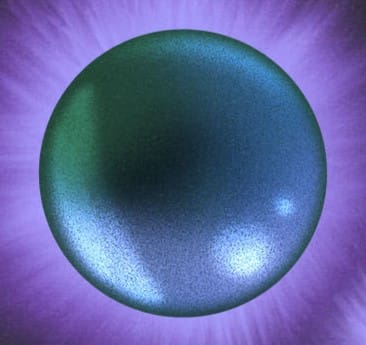Title Fight's 'Hyperview' is 2015's most important overrated album
It's been 10 years since Title Fight's genre-bending swan song. Its legacy is fascinating even though I dislike the music.

Title Fight's Hyperview turned 10 this week. That's a big milestone for people my age who care about the music I do, so I'm using this anniversary to say something: This album isn't very good. It's one of those records that's more culturally important than it is musically valuable. I feel the same way about Black Flag's My War, Quicksand's Slip, and Underoath's They're Only Chasing Safety: watershed albums that facilitated a before and after period for their respective genres, but that I've never personally found enjoyable to listen to on their own merits.
I told someone the other day that I have a "complicated relationship" with Title Fight's music. That's true. They were popping off as soon as I began listening to emo, pop-punk, and hardcore music (the genres they encapsulate) and so their presence was inescapable in the scenes I occupied in high-school and early college. I was growing as a listener in tandem with their artistic evolution. They got more indie as I became less interested in pop-punk. They were on the labels I loved and toured with bands I admired. They also sounded a lot like other bands I was into: Balance and Composure, Turnover, Basement – many of the groups who filled out the rosters of Run For Cover, No Sleep, and Topshelf Records.
I had every reason to be a Title Fight fan, but I wasn't. I loved the song "Secret Society" from 2012's Floral Green, which also included "Head in a Ceiling Fan" and "Numb But I Still Feel It" – my three favorite Title Fight songs. As a full record, though, it took me years (until quite recently, actually) to appreciate the majority of Floral Green. Title Fight's melodic hardcore beginnings, compiled on the The Last Thing You Forget comp, never struck a chord with me. Shed, their 2011 breakout that most Title Fight fans consider their best, and which was insurmountably crucial to the scene of bands I worshipped in high-school, remains impenetrable to me. I just never liked it. Hyperview, too.
Hyperview was the first major transitional record that my generation of punks and emos lived through. Ceremony had pivoted from hardcore a few years prior with the garage-rocky Zoo, but their goth pastiche, The L-Shaped Man, released a few months after Hyperview, was a more striking reinvention. Turnover's dream-pop makeover, Peripheral Vision, landed that same month: May 4th, 2015, the same day Superheaven went full-bore grunge with Ours Is Chrome, and just a month before Citizen released the darker, much less Tumblr-ready Youth follow-up, Everybody Is Going to Heaven. All of these bands who emerged from gelatinous pop-punk/emo/hardcore scene of the early 2010s were making pointed choices to evolve in 2015, and while Hyperview didn't end up having the longest tail of popularity (that would be Peripheral Vision, a record Turnover will perform to a sold-out Red Rocks crowd later this year) Title Fight's unexpected swan song ended up being the most prescient of this bunch.
Hyperview's impact was twofold: making half the hardcore scene apoplectic, and showing the other half the genre's exit. One of Hyperview's singles premiered on Vogue. Shortly after its release, Title Fight bassist-singer Ned Russin did a GQ feature about his hardcore t-shirt collection. The album was reviewed warmly by Pitchfork. It might be hard to imagine a time when articles like those mattered to the way an album was received, but I remember an entire month's worth of discourse about Title Fight getting looks from high-end fashion mags and being accepted into the snooty Pitchfork crowd – at a time when "hipster" culture still meaningfully existed, and hardcore, particularly the hardcore Title Fight came from, had very little to do with it. To some fans and haters, Hyperview was Title Fight's sellout album. The music was drab and snoozy, only occasionally rallying to a mid-tempo punk churn ("Chlorine," "Trace Me Onto You") and otherwise slumping listlessly through half-hearted bastardizations of jangly post-punk and somnolent slowcore.
Notice how I didn't say shoegaze. That's because Hyperview isn't a shoegaze album. In 2020, Hyperview producer Will Yip told me that the band weren't intending to make a shoegaze record; it simply turned out vaguely fuzzy, muted, and slow, and was then slotted into shoegaze – incorrectly, in my opinion. "We didn’t know we were making a shoegaze record," Yip told me for an article about shoegaze production. "But as we were mixing, we were like, we don't’ want the vocals to sit that high, we want the guitars a little fuzzier and chorusier." The floating-in-place singing and heavily reverbed guitars on "Dizzy" are reminiscent of shoegaze, but that song never gets loud or bulbous enough to qualify as such. The Swervedrivery guitar solo in "New Vision" is probably the closest the album ever comes to shoegaze. The rest of Hyperview, even at its chunkiest, is far too clean and glassy, the riffs too angular and precise, the basslines too pronounced, for it ever to sound like true-blue shoegaze.
Even so, Hyperview is one of the most important shoegaze-adjacent albums of the 21st century. It arrived just as Nothing, Whirr, and Pity Sex were making serious inroads in the punk scene while playing actual shoegaze, and so much of the reason why Whirr became popular was because Title Fight – who were quite popular in their time, albeit not nearly as big as they are now, posthumously – took them on tour and repped them. Hyperview was dubbed a shoegaze record mostly by people who didn't know what shoegaze was beyond Nothing, Whirr, Pity Sex, and Deafheaven. It was a misnomer, but it introduced a whole generation of listeners to the concept of shoegaze, and its position as "the final Title Fight album" ensured that people would continue talking about it and discussing its peculiar sound – thus constantly throwing the word "shoegaze" around —throughout the rest of the decade and into the present day.
All of this makes Hyperview a really interesting record to talk and think about. I just wish it was even half as interesting to listen to. It's been a decade and I must have given this record 30 chances at this point to hit me. It hasn't. I don't think it ever will. "Mrahc," "Chlorine," and "Trace Me Onto You" are bops, but they'd be better if they sounded how Title Fight did on Floral Green or even Shed: gritty, youthful, sweaty. Hyperview was written and recorded entirely in the studio after the band made a record that, according to Yip, "sounded too much like the record before." It sounds like a group of thoughtful, intentional musicians trying their best to grow out of the music that defined them in their teens. To prove that they could do more. To make what they wanted to hear in their heads, even if they didn't have the reference points for the genres they were toying with.
That naive innocence could've yielded some unplanned magic – the type of happy accidents and form-breaking experiments that only happen when a band are fumbling around in the dark, not writing songs with a scholarly appreciation for the genre they're working within. Unfortunately, that wasn't the case here. Instead, Title Fight produced a boring album that just happened to land at the right place and the right time for so much of their fanbase. Anyone who got into The Last Thing You Forget or Shed in their teens was likely entering their twenties when Hyperview arrived. It rung as suitably "mature" for people who were wearing The Story So Far shirts the year before but no longer thought Warped Tour music was cool. The fact that Title Fight delivered this record is the reason it's still being listened to in 2025. If any regular degular indie band had made Hyperview then it would've been entirely forgotten the month after it dropped.
It fascinates me that Hyperview remains so coveted, and that it's had such a marked influence on a genre it doesn't even belong to. I'm happy to see how important it's been to fellow writers, and I'll keep returning to it at least once a year to see if it ever finally clicks. And then, as I do every time Hyperview ends, I'll immediately flip on their 2013 Spring Songs EP, the superior set of "mature" Title Fight tracks. "Blush" and "Be a Toy" > anything on Hyperview, Shed, or The Last Thing You Forget.

